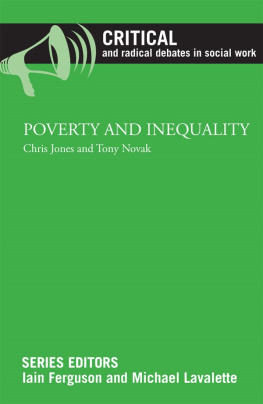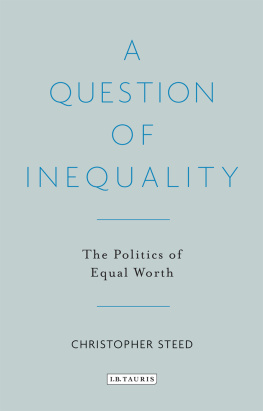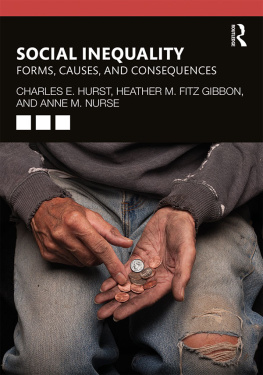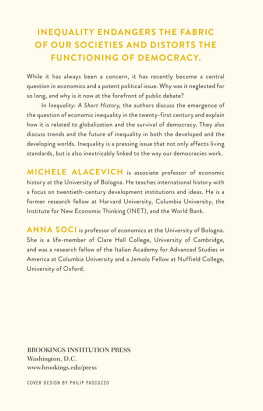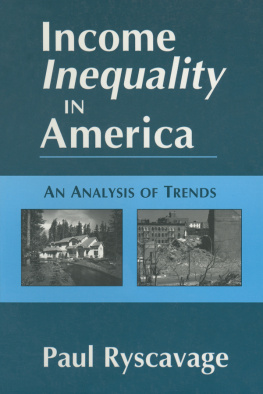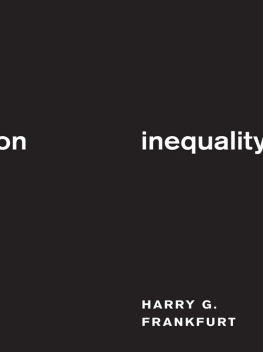First published 1986 by Transaction Publishers
Published 2017 by Routledge
2 Park Square, Milton Park, Abingdon, Oxon OX14 4RN
711 Third Avenue, New York, NY 10017, USA
Routledge is an imprint of the Taylor & Francis Group, an informa business
Copyright 1986 by James R. Kluegel and Eliot R. Smith.
All rights reserved. No part of this book may be reprinted or reproduced or utilised in any form or by any electronic, mechanical, or other means, now known or hereafter invented, including photocopying and recording, or in any information storage or retrieval system, without permission in writing from the publishers.
Notice:
Product or corporate names may be trademarks or registered trademarks, and are used only for identification and explanation without intent to infringe.
Library of Congress Catalog Number: 86-4476
Library of Congress Cataloging-in-Publication Data
Kluegel, James R.
Beliefs about inequality.
Bibliography: p.
Includes index.
1. EqualityPublic opinion. 2. EqualityUnited StatesPublic opinion. 3. Public opinionUnited States. I. Smith, Eliot R. II. Title.
JC575.K58 1986 320.01186-4476
ISBN 0-202-30326-8 (lib. bdg.)
ISBN 0-202-30327-6 (pbk.)
ISBN 13: 978-0-202-30327-7 (pbk)
The effort and support of many people have enabled us to write this book. The National Institute of Mental Health and the National Science Foundation provided funding for the collection and analysis of the principal survey data employed in our research. We appreciate their faith in our ability to produce results of potential use to the social science community. Other institutions provided support as well: the University of California, Riverside, with which we were both affiliated at the beginning of this project, and our current institutions, the University of Illinois at Urbana-Champaign and Purdue University. The principal survey was designed with the assistance of the Survey Research Laboratory at the University of Illinois, and carried out ably and expeditiously by its staff. Special thanks are owed its director, Richard Warnecke, for providing one of the authors with time to write, freed from the normal academic responsibilities that often slow the process of moving from ideas to the printed word.
Jan Hart, Peggy Henson, Janet Lauritsen, Miriam Lerner, and William Rudman provided very capable work as research assistants on this project. We are especially indebted to friends and colleagues who read drafts of chapters or sections of this book, and provided comments and suggestions: Kay Deaux, Joe R. Feagin, Myra Marx Ferree, James M. Jones, James H. Kuklinski, John Mirowsky, Thomas F. Pettigrew, Catherine Ross, and Bernard Weiner. We believe that the book is better for their help. Other colleagues too numerous to mention, including some anonymous reviewers, commented on earlier papers and presentations from this project and helped to shape and direct our research. In the most literal sense, this research would not have been possible without the cooperation of 2212 of our fellow American citizens who gave about an hour of their time to answering all the questions we could think of asking them. We thank them for their trust and patience.
Few experiences provide the same kind of ride on an emotional rollercoaster as writing a book. Our familiesKathleen, Alan and Leah Kluegel, and Pamela, Miranda, and Thomas Smithby their understanding and support, and by simply being there have kept us on track. Finally, we wish to note that the order of authorship is simply an accident of the alphabet. This book is the result of fully equal contributions. That we share credit equally, also means that we equally share responsibility for any errors.
James R. Kluegel
Eliot R. Smith
INTRODUCTION
Why are some Americans richer than I am? Do they work harder to succeed, or are they more talented than I am? Why are others poor: Are laziness and bad moral character primarily responsible for poverty or are lack of education and social and economic discrimination? Are the situations of the rich and the poor fair or unfair? And how am I to understand my own position in society? Perhaps my degree of economic well-being reflects my basic worth as a person, or perhaps I have experienced unusual barriers that have unfairly held me back from greater achievements. In the long run, do welfare programs or affirmative-action policies aid the disadvantaged, or do they undermine motivation and weaken the basis of the economic system? How much discrimination do racial minorities or working women experience todayisnt discrimination largely a thing of the past?
Americans of all political views and economic levels frequently consider these and similar questions about the current structure and implications of economic inequality in our society. Some of these issues seem to be important aspects of understanding the world in general; children often ask basic questions about wealth, poverty, and fairness, for example (Leahy, 1983). Others become important in the political process, as governmental policies aimed at one or another aspect of inequality are proposed and debated. All the questions together, and the tentative, incomplete answers that people construct, form the roots of the American consciousness of inequality, the subject of our investigation in this book.
It has often been remarked that Americans attitudes about social welfare and other inequality-related policies have an inconsistent and sometimes seemingly contradictory quality. The most recent example is, of course, the sharp change in direction of federal policy associated with the Reagan administrations goals of curtailing many of the redistributive programs developed since the New Deal. There are other examples as well. Americans generally accept the idea that blacks and other minorities have suffered from discrimination and maintain an abstract commitment to equal opportunitycoexisting with widespread white opposition to specific policies to implement equal opportunity (e.g., busing to desegregate schools, affirmative-action programs). Although Americans highly value equal citizenship rights and democratic politics in the abstract, in practice the right of the wealthy to wield disproportionate economic and political power is unchallenged. Finally, in the face of a general commitment to ameliorative measures for the very poor and to the right to be paid a basic living wage (floor limits on earnings), there is a widespread unwillingness to place an upper limit on incomes or inheritances. These aspects of contradiction and compromise in Americans beliefs and attitudes about inequality have stood as puzzles since at least the time of Alexis de Toqueville, drawing opinions from a variety of analysts and commentators.
Motivated by the desire to explain how Americans perceive and evaluate inequality and related programs and policies, we conducted a national survey of beliefs about social and economic inequality. Here we present the results of our research on the structure, determinants, and certain political and personal consequences of these beliefs. Our presentations in this book serve two major goals: to


